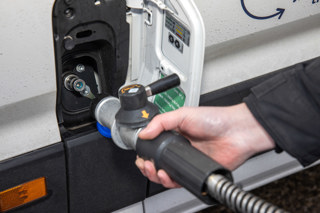UK businesses are being presented with a wealth of data to improve the efficiency and effectiveness of their fleet operations.
An acceleration in vehicle connectivity is opening access to information ranging from driver behaviour and vehicle performance, to pre-emptive maintenance, insurance and safety profiling. However, companies risk becoming overwhelmed if they fail to introduce the right processes and software.
“Whether you are looking at making changes, improvements or finding innovations, it all boils down to data,” says Denise Hawkins, fleet and insurance manager at ABM (pictured above). “We have data coming in from everywhere: telematics, fuel usage, service history, mileage reports, tyre history and accident reports.
“Data really can become your friend to trigger improvements and innovation when combined and analysed all together.”
However, having access to this huge amount of information has a downside: it is easy to be swamped by facts and figures.
“You’re not going to be alone with sometimes feeling like you’re drowning in the amounts of information you have,” says Hawkins.
Data is set to increase further in the coming years, according to Peter Golding, managing director of FleetCheck, with some fleet decision-makers already admitting they have not kept on top of everything their current systems can already achieve.
“A huge number of businesses are re-examining their fleet activities from the ground up – and data is an area where real gains can be made,” says Golding. “The aim is to use the information available to measure key objectives but also to investigate areas where they are able to gain new levels of oversight over their operations.”
The ability to access crucial business information from any location has become more important as the Covid-19 pandemic significantly increases remote working.
The continuous evolution of cloud storage, apps, driver personal digital assistants and artificial intelligence (AI) will play an important role.
AI enables fleet professionals to automate decisions and predict trends. It can be used to identify breakdown patterns for specific vehicles with specific mileage on the clock, for example, which can save businesses a significant amount of time and money.
For more on data and the role of fleet management software in running a modern fleet, look out for the feature in the January issue of Fleet News, available in print or digital edition from January 21




















Login to comment
Comments
No comments have been made yet.